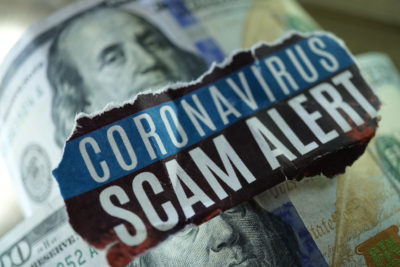The viral COVID-19 pandemic has had a big impact on the health and financial sectors of our nation and SafeAmerica Credit Union wants to inform our community of the fraud sweeping the nation. There have been thousands of incidents regarding coronavirus scams in which people are being taken advantage of due to the sudden spike in emotional distress. So together, as a community let us make sure we understand the tactics and methods scammers are using to obtain our personal information.
The Federal Trade Commission reported…
Coronavirus scams Scammers are using the COVID-19 pandemic as a tactic to defraud consumers. In the first nine days of April 2020, consumers filed about 7,200 complaints along with $7 million in coronavirus-related fraud. A number that quickly grew from the $4.8 million lost in the first three months of the year, to collectively sum together the nearly $12 million lost so far. If this rate continues, Americans could lose a minimum of $100 million by July 2020.
How are Coronavirus Scams being used?
- Fake Websites – Scammers have been impersonating legitimate websites with the effort of having unsuspecting people enter their sensitive information. There have also been reports of scammers asking for donations to help “fight” the pandemic.
- Health Insurance - Scammers have been making calls, Robocalls (recorded messages instead of a live person) and even going door to door with claims that they can offer COVID-19 Test Kits, information verification for your health insurance, or any other supposed additional benefits.
- Stimulus Checks –The IRS has reported that fraud checks have been mailed with strange dollar amounts with the goal of having potential victims call a number to “verify" information in order to cash it. A method of acquiring personal information.
Who is being targeted for Coronavirus Scams?
The Internal Revenue Service has warned that Coronavirus scams are targeting seniors and retirees and should be the most financially vigilant during this time. As a reminder, the IRS will NOT be contacting anyone, this means no phone calls, emails, postage or even in person meetings in order to complete their stimulus check rebate. Scammers see the COVID-19 pandemic as a chance to take advantage of others, especially if they can sense emotional confusion.

As a result, during this time we need to…
Remember!
- Validate who you are speaking with
- Validate web addresses, emails and any attachments by looking out for any misspellings, suspicious links or lack of brand consistency
- Be cautious of questions that may be a ploy to steal important personal information (Email, over the phone and even in-person)
- Scammers see the COVID-19 pandemic as a chance to take advantage of others, especially if they can sense emotional confusion.
- There is nothing wrong with hanging up phone calls
- Most importantly that this will all soon be over.
An objective and informed mind is a great tool to have but with the current situation remember to take a break from screens, social media and news outlets to prevent any feelings of being anxious, nervous or overwhelmed.
To learn even more about coronavirus scams or the stimulus rebate from legitimate and direct sources, visit the following resources
Unitednations.news.covid19.org
For more information about what SafeAmerica Credit Union is doing to keep you safe, click here

